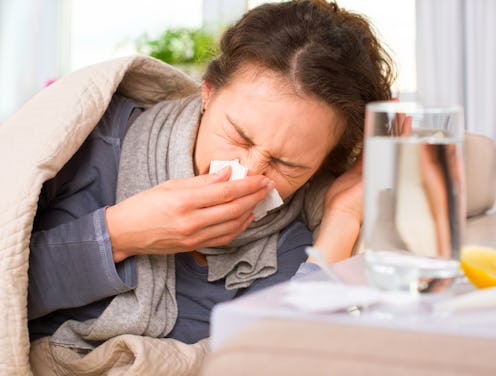Life
If You Feel Sick Around That Time Of The Month, “Period Flu” Might Be Why
Periods are, near-universally, regarded as the worst. There’s nothing less fun than realizing yet another pair of underwear has fallen victim to your monthly cycle, never mind the week of cramps, brain fog, and overall despair that seem inevitable the week before your bleed. But some people are taking note of more extreme symptoms during their luteal phase that can feel closer to an actual illness: Some folks experience extreme fatigue, nausea, weakness, chills, and other sensations during their time of the month, and have taken to calling it “period flu” accordingly. There are some misconceptions about what “period flu” is and is not, though, and it’s important to look at the different reasons you may be feeling sick during your period.
“Period flu” is not the same as having the actual flu, though, as Allure points out, you can definitely be sick with the flu and have your period at the same time. Rather, period flu is what happens when prostaglandins — aka, the fatty acid compound that’s responsible for dislodging your uterine lining and kick starting your period — get into your blood stream and begin to affect your intestinal system, causing those flu-like symptoms mentioned earlier.
"Women may feel like they are experiencing mood swings, heightened anxiety, irritability, bloating, tension, trouble concentrating, food cravings and depression before their period," Dr. Adeeti Gupta, founder of Walk In GYN Care, tells Bustle via email. "Before your period, estrogen levels and progesterone levels can fluctuate suddenly instead of slowly, which is why headaches, nausea and flu-like symptoms may appear."
As Dr. Molly O’Shea explained to U by Kotex, these hormones can cause “intestinal cramps, diarrhea, nausea, vomiting, a feeling of being flushed, and general achiness.” If feeling sick is a typical feature of your monthly cycle, you might want to bring it up with your OB/GYN or primary care doctor to talk about potential treatment options, like hormonal birth control.
As Bustle wrote about back in 2015, there’s actually some research that suggests our immune systems may be temporarily weakened when we have our periods, though that may be because of the added stress of just getting your period, on top of whatever else may be going on in your life. Steven R. Goldstein, MD, told Cosmopolitan in 2007 that some people might report cold or flu symptoms while they’re on their bleed, they might just feel more uncomfortable because of how your hormones are in flux during your period. "The drop in hormone levels prior to our period, as well as the stress brought on by PMS, can make these symptoms feel more pronounced,” he said. Symptoms like having a runny nose or a cough could be caused by allergens in your environment or a simple change in temperature, but you’re definitely not alone if you feel like you always get sick right around your period.
There are serious reasons, though, that you might be feeling sick around your period that you definitely shouldn’t ignore. Although the illness is relatively rare, the symptoms of Toxic Shock Syndrome — a bacterial infection that’s often associated with tampon use — are very similar to those of the flu: A sudden high fever, nausea or vomiting, and general achiness could all be signs of Toxic Shock Syndrome, according to Healthline. If your fever stays at or above 102 degrees Fahrenheit, regardless of whether or not you’ve recently used a tampon or other insertable menstrual hygiene product, you should schedule an appointment with your doctor to discuss the best course of treatment. As the UK's Toxic Shock Syndrome information service notes, out of about 60 million people, around 40 will get TSS, and it can be treated with antibiotics with early detection.
If you’re feeling excessively uncomfortable during your menstrual cycle, you don’t need to just push through it, even though we’ve been conditioned to expect our periods to be annoying or painful. "A simple OTC pain reliever can help alleviate symptoms," Dr. Gupta says. "Also hydration, exercise, activity, and healthy foods and a good level of nutrition can help." You can talk to your doctor about other potential lifestyle changes or birth control plans that can impact how much your period interferes with your daily life — which should be a minimum.
This post was originally published on January 13, 2018. It was updated on June 13, 2019.
This article was originally published on
